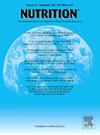Adherence to home parenteral nutrition and/or intravenous fluid infusions in patients with chronic intestinal failure: A multicenter cross-sectional study
IF 3.2
3区 医学
Q2 NUTRITION & DIETETICS
引用次数: 0
Abstract
Background
Patients with chronic intestinal failure (CIF) often experience reduced quality of life due to the psychosocial constraints of home parenteral nutrition (HPN) and/or fluid infusions. Despite its major impact on daily life, adherence to these treatments remains poorly documented.
Aim
To assess adherence to HPN and/or fluid infusions in adult CIF patients and identify associated factors.
Methods
This multicenter, cross-sectional study included CIF patients from six French HPN centers. Eligible patients were ≥18 years old, on HPN and/or fluid infusions for ≥6 months with a stable regimen for ≥3 months. Adherence was assessed via self-reported questionnaires, physician and coordinating nurse evaluations, and phone interviews. Anxiety and depression were evaluated using the Hospital Anxiety and Depression Scale, and the Wake Forest Physician Trust Scale measured trust in the physician.
Results
A total of 126 patients were included; 82% had their infusions administered by nurses. Overall, 24% of patients exhibited poor adherence, with 9.5% negotiating treatment and 18% missing infusions. Poor adherence was associated with low weekly infusion volume (<7750 mL, odds ratio [OR] 3.31, 95% confidence interval [CI] [1.09–11.2], P = 0.041), high anxiety scores (OR 5.29, 95% CI [1.58–19.2], P = 0.008), and low trust in physicians (Wake Forest Physician Trust Scale, OR 0.90, 95% CI [0.82–0.98], P = 0.018). Coordinating nurses’ perception strongly predicted adherence.
Conclusions
One in four CIF patients showed poor adherence. Those with low infusion volumes, high anxiety, or low physician trust require close monitoring. Coordinating nurses play a key role in identifying non-adherence.
慢性肠衰竭患者坚持家庭肠外营养和/或静脉输液:一项多中心横断面研究
背景:慢性肠衰竭(CIF)患者通常由于家庭肠外营养(HPN)和/或液体输注的心理社会限制而导致生活质量下降。尽管它对日常生活有重大影响,但这些治疗的依从性仍然缺乏记录。目的评估成人CIF患者对HPN和/或液体输注的依从性,并确定相关因素。方法这项多中心横断面研究纳入了来自法国六个HPN中心的CIF患者。符合条件的患者年龄≥18岁,HPN和/或液体输注≥6个月,稳定方案≥3个月。依从性通过自我报告问卷、医生和协调护士评估以及电话访谈来评估。使用医院焦虑和抑郁量表评估焦虑和抑郁,并使用Wake Forest医生信任量表测量对医生的信任。结果共纳入126例患者;82%的患者由护士进行输液。总体而言,24%的患者表现出较差的依从性,9.5%的患者协商治疗,18%的患者漏注。依从性差与低每周输注量(<7750 mL,比值比[OR] 3.31, 95%可信区间[CI] [1.09-11.2], P = 0.041)、高焦虑评分(OR 5.29, 95% CI [1.58-19.2], P = 0.008)和对医生的低信任度(Wake Forest医生信任量表,OR 0.90, 95% CI [0.82-0.98], P = 0.018)相关。协调护士的感知强烈预测依从性。结论1 / 4的CIF患者依从性较差。输液量低、高度焦虑或医生信任度低的患者需要密切监测。协调护士在识别不依从方面发挥关键作用。
本文章由计算机程序翻译,如有差异,请以英文原文为准。
求助全文
约1分钟内获得全文
求助全文
来源期刊

Nutrition
医学-营养学
CiteScore
7.80
自引率
2.30%
发文量
300
审稿时长
60 days
期刊介绍:
Nutrition has an open access mirror journal Nutrition: X, sharing the same aims and scope, editorial team, submission system and rigorous peer review.
Founded by Michael M. Meguid in the early 1980''s, Nutrition presents advances in nutrition research and science, informs its readers on new and advancing technologies and data in clinical nutrition practice, encourages the application of outcomes research and meta-analyses to problems in patient-related nutrition; and seeks to help clarify and set the research, policy and practice agenda for nutrition science to enhance human well-being in the years ahead.
 求助内容:
求助内容: 应助结果提醒方式:
应助结果提醒方式:


